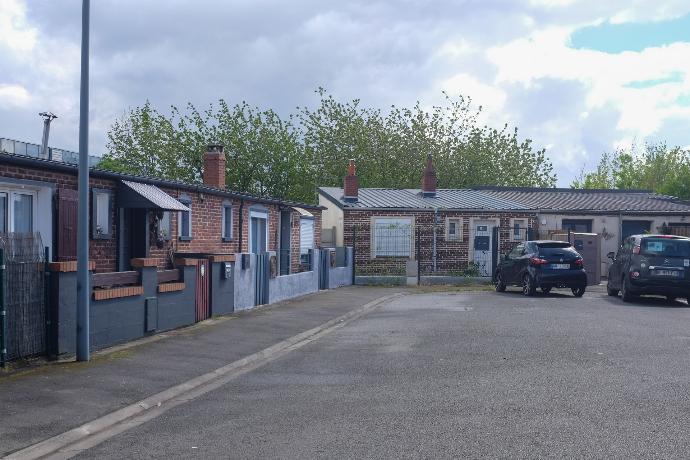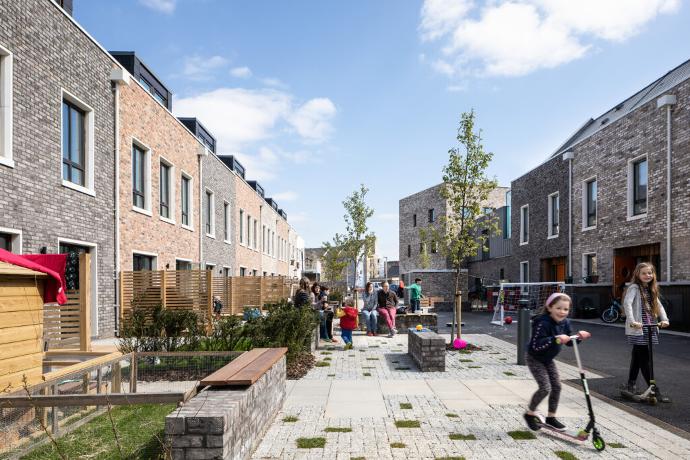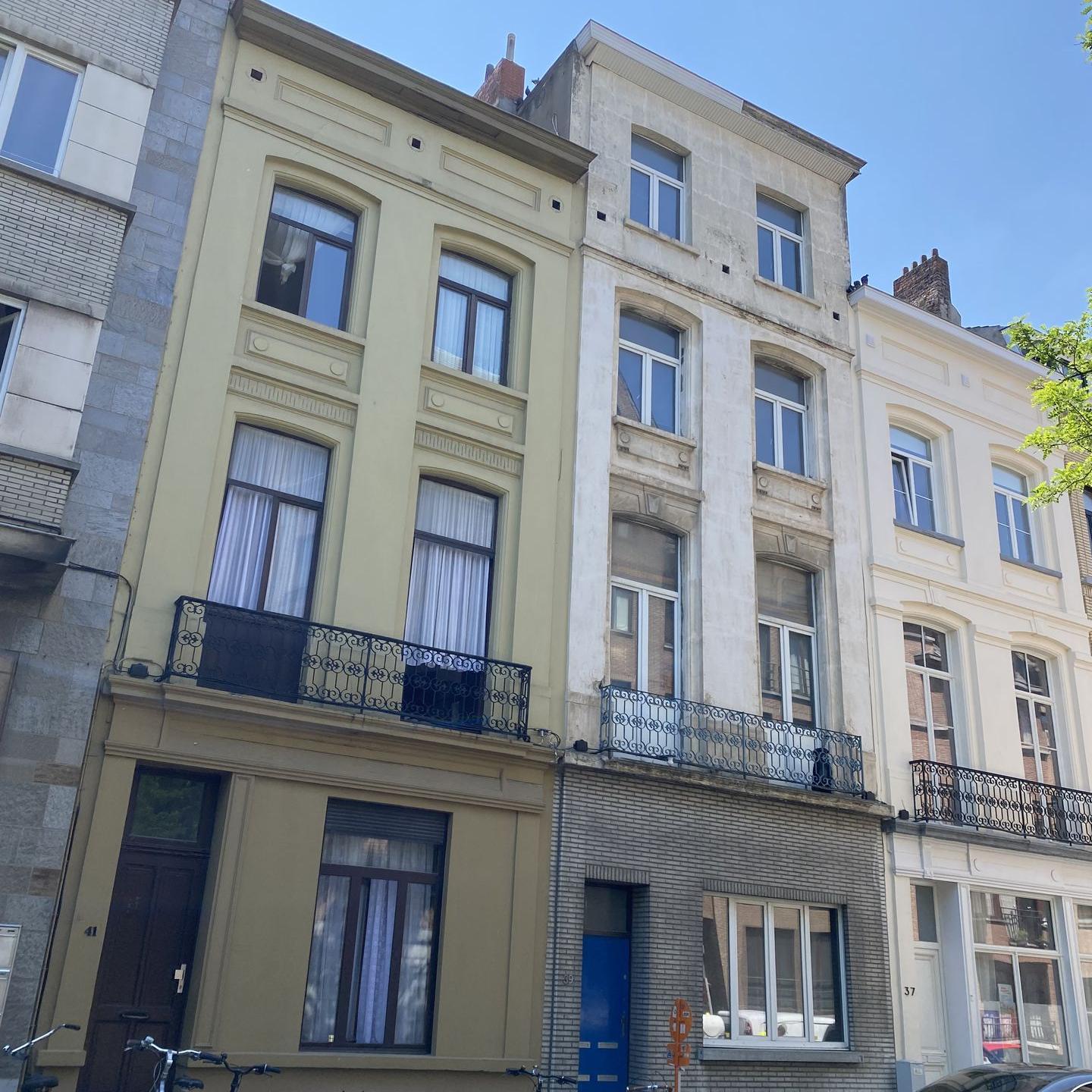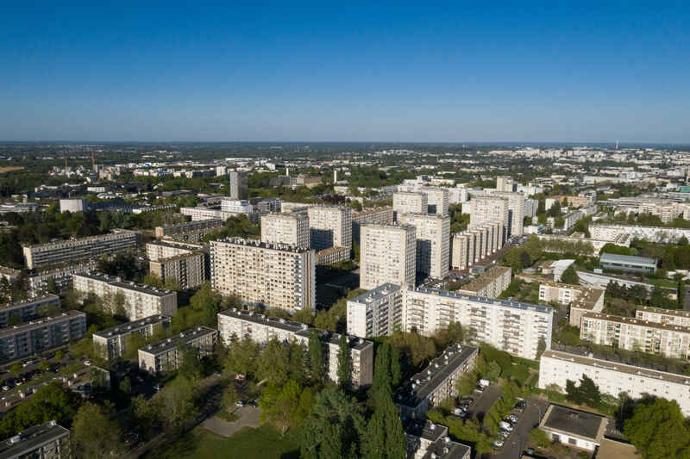France - City of Lille
Located in the Petit Maroc neighbourhood, the 15 targeted houses were built in the 1950s with basic materials and are approximately 40m² in size. They are energy inefficient and in urgent need of rehabilitation. The project aims to first create a demonstration of rehabilitation following the Upcycling Trust model, and then promote the renovation of additional homes.
Objectives:
- Prioritize the upcycling of vacant buildings to provide temporary housing for social tenants
- Limit squatting: temporary rental while the full rehabilitation is carried out.
- Enhance tenant comfort through thermal and safety renovations - improve the architectural image of the neighborhood.
Challenges:
- Balance project’s economic model
- Assess willingness of owners to take part in the project
Four Upcycling Trust partners will support the project in Lille: the City of Lille, Living 2030, Lille European Metropolis (MEL), and Metropole of Lille Housing (LMH). The City of Lille, which leads the Upcycling Trust Project, will manage and coordinate the partnership, ensuring proper progress and coordination.

 Photo: CLT Ghent
Photo: CLT Ghent Ghent - Belgium
The pilot project in Ghent aims to sustainably renovate a post-fire private home in "Spijkstraat" residential area, into 4 housing units and one community space for the neighbourdhood.
Objectives:
- To renovate the building and transform it into 4 housing units and one community space for the neighbourhood
- Legal and financial mechanism: combination of donation and purchase by CLT Ghent, which retains ownership of the land
CLT Ghent will be the sole project partner, contributing legal, financial, and community-building expertise. Het Pandschap is in charge of the renovation process.
Ireland- City of Cork
In Cork’s historic city centre, vacancy rates remain high. SOA and Cork City Council will renovate a vacant local authority-owned dwelling. This circular retrofit will transform the unit from a standard social rental into an affordable cost-rental home, specifically targeting lower-middle income households currently underserved by existing housing solutions.
Context:
- CLTs recognised in Ireland by law in the Affordable Housing Act 2021 - Cork CLT is the first pilot
- Several vacant buildings in the historical center (vacancy rates Centre B: 8%, Farranferris A: 9.5%. Census 2022)
Objectives:
- Renovation of a Local Authority ‘void’ dwelling. Circular retrofitting of a social housing dwelling which is now vacant and which is unsuitable for immediate re-occupation.
- SOA and Cork City Council will renovate one dwelling that is currently classed as a social rental dwelling to an affordable ‘cost-rental’ dwelling aimed at the mid–lower end of the intermediate segment.
Two organizations, Self Organised Architecture Research CLG (SOA) and the Cork City Council, will support the pilot project.
 Photo: David Butler
Photo: David Butler  Photo: Community Land Trust Brussels
Photo: Community Land Trust BrusselsBrussels - Belgium
Pack CLT Réno-Solidaire
In Brussels, the Upcycling Trust model is being implemented by Community Land Trust Bruxelles (CLTB) through the development of the Pack CLT Réno-Solidaire. This pilot explores how to make deep energy renovations accessible to vulnerable homeowners while ensuring long-term housing affordability through the CLT model, especially in a context of rising renovation obligations and gentrification.
The Pack CLT Réno-Solidaire is a social financing tool for energy renovation coupled with technical support over the renovation process and after, allowing low-income owner-occupants to renovate their homes without incurring debt. In exchange of the CLT pack, the homeowners commit to integrate the CLTB system, accepting the following conditions:
- In case of house rental, it will be through social terms
- In case of house sale, it will be throughout the CLTB system
- The mutual commitment between CLTB and the owner-occupant is recorded in an authentic act.
Renovations aim to raise buildings from PEB F or G to at least PEB C, in alignment with Brussels’ CoBRACE targets and the regional Stratégie Rénolution.
Prevent displacement of low-income owner-occupants due to renovation mandates
Provide all-in-one support (technical, legal, social, and financial) before, during and after the renovation
Develop a scalable, legally secure model for Brussels and beyond
Demonstrate how renovation subsidies can be paired with long-term affordability via CLTs
CLTB is currently testing the pack réno-solidaire with two homeowners in Saint-Gilles, a neighbourhood under the pressure of gentrification, where energy-poor housing meets intense market pressure. Both participants are at risk of renoviction but have engaged voluntarily, drawn by the project's values of solidarity, sustainability and housing security.
Case 1: Small Apartment in a Co-ownership
A homeowner (Rodolphe) lives in a small apartment within a three-unit co-owned building. Facing energy poverty and unable to finance mandatory upgrades, he risks:
Fines for non-compliance
Delaying the building's collective renovation
Pressure to sell his home
Deeply rooted in his community as an artist, he has partnered with CLTB and CAFA (Réseau Habitat) to explore retrofit options. Talks with fellow co-owners are ongoing.
Case 2: Mixed-Use House in Disrepair
This building includes two housing units and a commercial space. The structure is in poor condition, and the homeowner (Yolande) risks involuntary sale due to unaffordable repairs. With an architect already appointed, renovation planning is underway. Notably:
A vacant second unit will be renovated and resold to allow the owner's home to carry out major works that are not energetic
Agreement of co-owners needed in multi-unit buildings
Subdivision of homes sometimes required to make projects viable
Testing the potential to form community clusters from scattered single-family properties
Receiving EU funds for upscaling the project
Recipient: Réno-Hope Prize 2024 (Fondation Roi Baudouin)
Shortlisted: nomination fo "Armoede Uitsluiten" Award 2025 (Welzijnszorg)
These pilots are supported by Renolab ID and King Baudouin Foundation "Reno'hope award".
Rennes - France
The Rennes pilot explores how land stewardship tools like the Organisme de Foncier Solidaire (OFS) can be applied not only to new housing developments, but also to existing private housing.
Villejean neighbourhood is a post-war, large condominium district, near a large university campus. Two current trends are leading to a fall in the number of intermediate families living in the district :
- Pressure on the housing market from the development of shared student accommodation in family flats (more profitable)
- The impoverishment of the population living in the district.
The project aims to intervene in private condominiums with a specific objective of bringing back more socially-diverse families in the neighbourhood.
The project consists in the OFS acquiring individual family units in private condominiums, to both ensure affordable housing for families and attract middle-income families to the area. Moreover the OFS becomes part of the co-ownership and can encourage the renovation of the building.
- Protect affordability in private housing through public land stewardship
- Reclaim buildings from speculative cycles and promote long-term investment
- Support mixed-tenure, socially balanced housing through ownership diversification
- Explore how OFS model can support energy renovation in the private market
- Finding units suitable for purchase within fragmented ownership structures
- Convincing co-owners to engage in a collective renovation process
The OFS purchases a unit in a condominium
- It joins the co-ownership, introduces renovation plans, and helps guide improvements
- Over time, it builds community capacity and investment, using public support and affordable resale mechanisms

